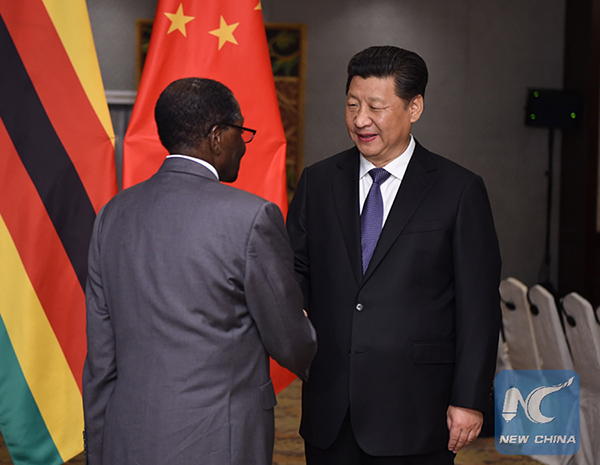File photo of Chinese President Xi Jinping (R) meeting with Zimbabwean
President Robert Mugabe in Jakarta, capital of Indonesia, April 23, 2015.
Zimbabwe expects closer collaboration with China in industrialization and an increased role for the renminbi in the market, says the country's ambassador to China, Paul Chikawa.
The two countries have enough in common industrially to be able to help each other, he says.
He made the remarks in an interview with China Daily before President Xi Jinping visits the country from Dec 1 to 2.
"Whether we are ready for industrialization is a complex question, because some of the infrastructure is still lacking, but it is a big yes in terms of our continuous commitment to this process," he says.
Although China is the world's second-largest economy in terms of GDP, Chikawa says the country is No 1 in the world in purchasing power parity, which has taken the country's industrialization to a stage where it has excess manufacturing capacity. That provides opportunities for the two countries to work together, he says.
"Zimbabwe used to enjoy an advantageous industrial position in the region, but later was curtailed for various reasons. Now China has strong development experience to share, and demand to export its excess capacity. We believe this can meet our ambition to revive industries."
China's financial capacity also provides a strong guarantee to its overseas expansion given its strong capital funding base, abundant foreign reserves and the increasingly important renminbi, he says.
He sees an increasing role for the currency in his country, helping maintain investment confidence and delivering convenience to the financial market.
Two countries just right for each other, says the envoy. "It is playing an important role in the international economy, and we want to see the same thing in Zimbabwe."
Chikawa says convergence between China and Zimbabwe is reflected in the draft plan of the Zimbabwean Agenda for Sustainable Social Economic Transformation, a set of policies on industrialization.
"The Chinese government has also drawn up an impressive and clear roadmap for relocating its industries by initiating the Belt and Road Initiative, as well as gaining support for the Asian Infrastructure Investment Bank. These conditions can nurture practical and concrete industrial cooperation."
China and Zimbabwe have a special relationship that has endured changes in the international political environment over the past 50 years, he says.
"It's not a relationship of exploitation but a relationship in which both sides are prepared to make the best use of each other's comparative advantages. We do not work as master and servant but as equal partners in a relationship of mutual respect."
Industrialization is vital to the country's two key sectors, agriculture and mining industry, he says.
"Weather and land conditions in our country are suitable for many crops, and we have a strong agriculture sector. But we need to ask if we will continue to trade them as primary products or you process them into finished products. So industrialization is also a good opportunity for agriculture."
Once the products are processed locally in Zimbabwe, getting them to local and international markets is easy given the country's geographic advantage. That includes linking the countries that are richest in mineral resources, he says.
"Ordinarily, people would see being inland as a disadvantage, but I see it as an advantage because we are there as a key place linking Africa in all directions. Southern Africa in general is also in quite a strategic position in the continent with rich resources, having 60 to 70 percent of the world's mineral resources. We are also a neighbor of the most sophisticated economy in Africa - South Africa."
More than 50 kinds of minerals can be found in Zimbabwe, some in abundance. Its neighbors, such as the Democratic Republic of Congo, Mozambique and Zambia are all richly endowed with natural resources, including nickel, coal, diamonds, gas and copper, he says.
More importantly, with deepening regional integration, the country is benefiting from its membership of different regional organizations, including the Southern African Development Community, the Eastern African Community and the Common Market for Eastern and Southern Africa, which has a total population of 650 million, giving it huge market potential.
For China and Zimbabwe to work more closely together, Chikawa says skills transfer is crucial. China should bring more technologies and skills to the country and educate locals. A whole industry chain can be established once human capacity and natural resources can be perfectly matched.
The country wants to commit itself to establishing a sustainable investment environment for foreign investors, many of whom have concerns over issues such as the rule of law, he says.
"We also need to engage our partners in a sincere and faithful exchange to see what fields need attention and clarification."
A stagnant financial market in the country also worries many foreign investors, but Chikawa says the government is determined to attract and protect foreign investment.
"We have institutions to guarantee and protect foreign investment, as we know fair money will benefit both the investor and our country. So you can repatriate 100 percent of your investment if you decide not to continue your business in our country."
China Daily
Please
contact us in case of Copyright Infringement of the photo sourced from the internet, we will remove it within 24 hours.

